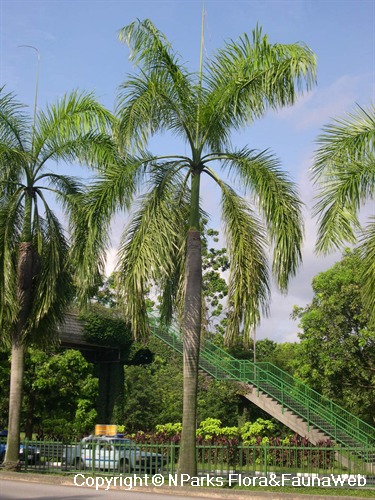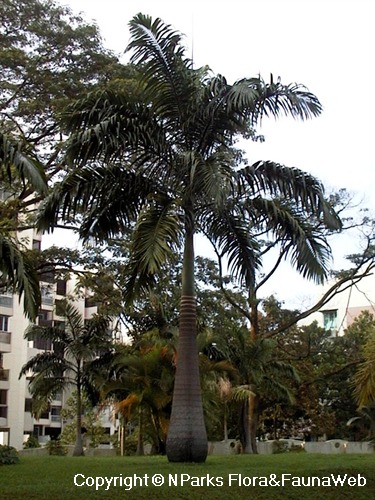
Back
Roystonea regia (Kunth) O.F.Cook
| Family Name: | Arecaceae (Palmae) |
| Synonyms: | Euterpe ventricosa, Roystonea ventricosa, Acanthophoenix elata, Roystonea elata, Roystonea floridana, Oreodoxa regia |
| Common Name: | Florida Royal Palm, Royal Palm, Cuban Royal Palm, 王宗, 大王椰子, 高王椰子 |
Name
Classifications and Characteristics
| Plant Division | Angiosperms (Flowering Seed Plants) (Monocotyledon) |
|---|---|
| Plant Growth Form | Palm (Solitary Habit) |
| Lifespan (in Singapore) | Perennial |
| Mode of Nutrition | Autotrophic |
| Plant Shape | Fountain (Palm-like) |
| Maximum Height | 15 m to 25 m |
| Maximum Plant Spread / Crown Width | 5 m |
Biogeography
| Native Distribution | South Florida, Mexico, Central America and Caribbean |
|---|---|
| Preferred Climate Zone | Tropical |
Description and Ethnobotany
| Others - Plant Morphology | Tall attractive palm. Trunk single, massive, bulging slightly towards the middle, concrete-grey with closely-spaced rings. Crownshaft glossy green, smooth and up to 2m in length, topped by crown of leaf fronds. Fronds simple, pinnately-compound (feather-like), up tp 3m long, plumose and rather tangled appearance. Dead leaves are self-pruning and fall off plant as single whole fronds.Flowers cream-coloured, small, unisexual, separate male and female flowers on same plant, clustered in threes with female flower in between 2 much larger male flowers. Borne on large, much-branched panicles (up to 1m across) below crownshaft, emerging from horn-shaped bracts. Fruits round to oval, mature from green to brownish-red or dark purple, single-seeded.Fast-growing ornamental palm, looks especially impressive when formally massed along avenues and boulevards. Drought and fairly salt-tolerant. Propagate by seeds. Prone to being attacked by rhinocerous beetles, which damage growing point (resulting in palm death), or damaged leaflets. Spray crown regularly with insecticide to deter beetles.Middle trrunk bulge differentiates it from similar-looking relative Roystonea oleracea (Cabbage Palm), which has swollen bulge at base of trunk instead. Genus name 'Roystonea' named in honour of General Roy Stone (1836-1905), an American army engineer who worked in Puerto Rico. Species epithet 'regia' means 'royal', a reference to palm's majestic and stately appearance. |
|---|---|
| Ethnobotanical Uses | Food (Herb or Spice) Others: Fruits used as feed for livestock. Palm heart ('cabbage') edible. Trunks and leaves used in construction of simple houses. Wood used to make handicrafts. |
Landscaping Features
| Desirable Plant Features | Ornamental Foliage |
|---|---|
| Landscape Uses | General, Suitable for Roadsides, Coastal |
Fauna, Pollination and Dispersal
| Fauna Pollination Dispersal Associated Fauna | Bird-Attracting |
|---|---|
| Pollination Method(s) | Biotic (Fauna) (Insects (Bee), Insects (Ant, Beetle, Fly, Thrip, Wasp)) |
| Seed or Spore Dispersal | Biotic (Fauna) |
Plant Care and Propagation
| Light Preference | Full Sun |
|---|---|
| Water Preference | Moderate Water |
| Plant Growth Rate | Moderate |
| Rootzone Tolerance | Fertile Loamy Soils, Well-Drained Soils, Saline Soils / Salt Spray, Drought Tolerant |
| Diseases | Prone to being attacked by rhinocerous beetles, which damage growing point (resulting in palm death), or damaged leaflets. Spray crown regularly with insecticide to deter beetles. |
| Propagation Method | Seed |
| Maintenance Requirements Remarks | Drought-tolerant but prefers moist to wet conditons for optimal growth. |
Foliar
| Foliage Retention | Evergreen |
|---|---|
| Mature Foliage Colour(s) | Green |
| Mature Foliage Texture(s) | Smooth, Glossy / Shiny |
| Foliar Type | Compound (Even-Pinnate) |
| Foliar Shape(s) | Non-Palm Foliage (Linear), Palm Fronds (Pinnate / Feather) |
| Foliar Venation | Parallel |
| Foliar Margin | Pinnately Lobed / Pinnatifid |
| Foliar Apex - Tip | Acuminate |
| Foliar Base | Truncate / Square |
| Typical Foliar Area | Megaphyll (>1640.25cm2 ) |
| Leaf Area Index (LAI) for Green Plot Ratio | 2.5 (Palm - Solitary) |
Non - Foliar and Storage
| Trunk Type (Non Palm) | Non Woody |
|---|---|
| Trunk Type (Palm) | Solitary Habit, Aboveground |
| Root Type | Underground (Fibrous Root) |
Floral (Angiosperm)
| Flower & Plant Sexuality | Unisexual Flowers , Monoecious |
| Flower Colour(s) | Cream / Off-White, Yellow / Golden |
|---|
| Flowering Period | Free-Flowering |
| Flowering Habit | Polycarpic |
Fruit, Seed and Spore
| Mature Fruit Colour(s) | Brown, Purple, Red |
|---|---|
| Fruit Classification | Simple Fruit |
| Fruit Type | Fleshy Fruit , Berry |
Image Repository
Others
| Master ID | 1389 |
|---|---|
| Species ID | 2682 |
| Flora Disclaimer | The information in this website has been compiled from reliable sources, such as reference works on medicinal plants. It is not a substitute for medical advice or treatment and NParks does not purport to provide any medical advice. Readers should always consult his/her physician before using or consuming a plant for medicinal purposes. |

